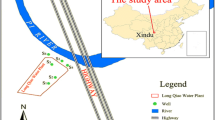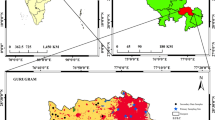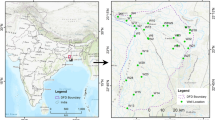Abstract
Groundwater is the primary source for drinking purposes in all over the world. The present study is carried out to evaluate the groundwater suitability for drinking purposes. For this purposes, thirty groundwater samples were collected from active boreholes in the investigated region and analyzed for concentrations of various physico-chemical parameters. Chadha diagram was used to better understand the hydro-geochemistry, while fuzzy comprehensive assessment method (FCAM) was introduced to delineate the overall groundwater quality for drinking purposes. Groundwater is slightly alkaline in nature in this study region, and the dominant hydrochemical facie is HCO3−-Na+ which is a reflection of the predominant rock-water interaction in the region. Results of FCAM demonstrated that 73% of groundwater samples were most suitable for drinking purposes and remaining 27% were poor in quality which were unsuitable for drinking purposes in the investigated region.




Similar content being viewed by others
References
Adimalla N (2020) Controlling factors and mechanism of groundwater quality variation in semiarid region of South India: an approach of water quality index (WQI) and health risk assessment (HRA). Environ Geochem Health 42(6):1725–1752. https://doi.org/10.1007/s10653-019-00374-8
Adimalla N, Qian H (2019) Groundwater quality evaluation using water quality index (WQI) for drinking purposes and human health risk (HHR) assessment in an agricultural region of Nanganur, south India. Ecotoxicol Environ Saf 176:153–161. https://doi.org/10.1016/j.ecoenv.2019.03.066
APHA (2012) Standard methods for the examination of water and wastewater. American Public Health Association, Washington
BIS (2012) Indian standard specifications for drinking water, IS:10500, Bureau of Indian Standards, New Delhi
Chadha DK (1999) A proposed new diagram for geochemical classification of natural waters and interpretation of chemical data. Hydrogeol J 7(5):431–439
Chandrasekar T, Sabarathinam C, Nadesan D, Rajendiran T, Banajarani Panda BR, Keesari T, Mohan Viswanathan P, Utharapathi V, Alagappan R (2019) Geochemical (process based) characterization of groundwater along the KT boundary of South India. Geochemistry 79(1):62–77
Chen J, Wu H, Qian H, Li X (2018) Challenges and prospects of sustainable groundwater management in an agricultural plain along the Silk Road Economic Belt, north-west China. Int J Water Resour Dev 34(3):354–368
Chen J, Huang Q, Lin Y, Fang Y, Qian H, Liu R, Ma H (2019) Hydrogeochemical Characteristics and Quality Assessment of Groundwater in an Irrigated Region, Northwest China. Water 11(1)
Dahiya S, Singh B, Gaur S, Garg VK, Kushwaha HS (2007) Analysis of groundwater quality using fuzzy synthetic evaluation. J Hazard Mater 147(3):938–946. https://doi.org/10.1016/j.jhazmat.2007.01.119
Domenico PA, Schwartz FW (1990) Physical and chemical hydrogeology. Wiley, New York
Elumalai V, Brindha K, Elango L (2017a) Regional and temporal variation in minor ions in groundwater of a part of a large river delta, southern India. Environ Monit Assess 189:305. https://doi.org/10.1007/s10661-017-6006-3
Elumalai V, Brindha K, Lakshmanan E (2017b) Human exposure risk assessment due to heavy metals in groundwater by pollution index and multivariate statistical methods: a case study from South Africa. Water 9:234
Gong L, Jin C (2009) Fuzzy comprehensive evaluation for carrying capacity of regional water resources. Water Resour Manag 23:2505–2513. https://doi.org/10.1007/s11269-008-9393-y
He S, Wu J (2019) Hydrogeochemical characteristics, groundwater quality, and health risks from hexavalent chromium and nitrate in groundwater of huanhe formation in Wuqi County, Northwest China. Expo Health 11:125–137. https://doi.org/10.1007/s12403-018-0289-7
Kiurski-Milošević JŽ, Vojinović-Miloradov MB, Ralević NM (2015) Fuzzy model for determination and assessment of groundwater quality in the city of Zrenjanin. Serbia HemijskaIndustrija 69(1):17–28. https://doi.org/10.2298/hemind131215016k
Li P, Tian R, Liu R (2019) Solute geochemistry and multivariate analysis of water quality in the Guohua Phosphorite Mine, Guizhou Province, China. Expo Health 11(2):81–94
Liu J, Jin D, Wang T, Gao M, Yang J, Wang Q (2019) Hydrogeochemical processes and quality assessment of shallow groundwater in Chenqi coalfield, Inner Mongolia, China. Environ Earth Sci 78(12):347
Mthembu PP, Elumalai V, Brindha K, Li P (2020) Hydrogeochemical processes and trace metal contamination in groundwater: impact on human health in the Maputaland Coastal Aquifer, South Africa. Expo Health 12:403–426. https://doi.org/10.1007/s12403-020-00369-2
Mukate S, Wagh V, Panaskar D, Jacobs JA, Sawant A (2019) Development of new integrated water quality index (IWQI) model to evaluate the drinking suitability of water. Ecol Indic 101:348–354
Narsimha A, Sudarshan V (2017a) Assessment of fluoride contamination in groundwater from Basara, Adilabad District, Telangana State, India. Appl Water Sci 7(6):2717–2725. https://doi.org/10.1007/s13201-016-0489-x
Narsimha A, Sudarshan V (2017b) Contamination of fluoride in groundwater and its effect on human health: a case study in hard rock aquifers of Siddipet, Telangana State, India. Appl Water Sci 7(5):2501–2512. https://doi.org/10.1007/s13201-016-0441-0
Sakram G, Adimalla N (2018) Hydrogeochemical characterization and assessment of water suitability for drinking and irrigation in crystalline rocks of Mothkur region, Telangana State, South India. Appl Water Sci 8(5):143. https://doi.org/10.1007/s13201-018-0787-6
Singh S, Ghosh NC, Gurjar S, Krishan G, Kumar S, Berwal P (2018) Index-based assessment of suitability of water quality for irrigation purpose under Indian conditions. Environ Monit Assess 190:29. https://doi.org/10.1007/s10661-017-6407-3
Singh S, Ghosh NC, Krishan G, Kumar S, Gurjar S, Sharma MK (2019) Development of indices for surface and ground water quality assessment and characterization for Indian conditions. Environ Monit Assess 191:182. https://doi.org/10.1007/s10661-019-7276-8
Subba Rao N, Marghade D, Dinakar A, Chandana I, Sunitha B, Ravindra B, Balaji T (2017) Geochemical characteristics and controlling factors of chemical composition of groundwater in a part of Guntur district, Andhra Pradesh, India. Environ Earth Sci 76(21):747
Subba Rao N, Sunitha B, Adimalla N, Chaudhary M (2020) Quality criteria for groundwater use from a rural part of Wanaparthy District, Telangana State, India, through ionic spatial distribution (ISD), entropy water quality index (EWQI) and principal component analysis (PCA). Environ Geochem Health 42(2):579–599. https://doi.org/10.1007/s10653-019-00393-5
Taloor AK, Pir RA, Adimalla N, Ali S, Manhas DS, Roy S, Singh AK (2020) Spring water quality and discharge assessment in the Basantar watershed of Jammu Himalaya using geographic information system (GIS) and water quality Index (WQI). Groundw Sustain Dev 10:100364. https://doi.org/10.1016/j.gsd.2020.100364
Verma DK, Bhunia GS, Shit PK, Tiwari AK (2018) Assessment of groundwater quality of the Central Gangetic Plain Area of India using geospatial and WQI techniques. J Geol Soc India 92(6):743–752
Wang H, Cai Y, Tan Q, Zeng Y (2017) Evaluation of groundwater remediation technologies based on fuzzy multi-criteria decision analysis approaches. Water 9:443. https://doi.org/10.3390/w9060443
Wang J, Yan H, Xin K, Tao T (2020) Risk assessment methodology for iron stability under water quality factors based on fuzzy comprehensive evaluation. Environ Sci Eur 32:81. https://doi.org/10.1186/s12302-020-00356-z
WHO (2011) Guidelines for drinking water quality. World Health Organization, Geneva
Wu C, Fang C, Wu X, Zhu G, Zhang Y (2020) Hydrogeochemical characterization and quality assessment of groundwater using self-organizing maps in the Hangjinqi gasfield area, Ordos Basin, NW China. Geosci Front. https://doi.org/10.1016/j.gsf.2020.09.012
Acknowledgments
Thanks are due to Editor-in-Chief and anonymous reviewers for their constructive comments helped us in bringing the manuscript to its present form.
Funding
The author received financial support from the Department of Science and Technology (DST)-Science and Engineering Research Board (SERB) Government of India, New Delhi, and the Research Funds for Start-Up Research Grant (Young Scientists) project (SR/FTP/ES-13/2013).
Author information
Authors and Affiliations
Corresponding author
Additional information
This article is part of the Topical Collection on Recent advanced techniques in water resources management
Rights and permissions
About this article
Cite this article
Adimalla, N. Groundwater quality delineation based on fuzzy comprehensive assessment method (FCAM): a case study. Arab J Geosci 13, 1256 (2020). https://doi.org/10.1007/s12517-020-06265-y
Received:
Accepted:
Published:
DOI: https://doi.org/10.1007/s12517-020-06265-y




